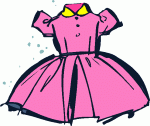 Possession
Possession
 ¿Es mi chaqueta o tu chaqueta?
¿Es mi chaqueta o tu chaqueta?
In Spanish to show possession like in the English language you use possessive adjectives. The possessive adjectives in Spanish are:
Singular |
Plural |
English Translation |
Mi |
Mis |
My |
Tu |
Tus |
Your |
Su |
Sus |
His, her, your (formal), their |
nuestro/nuestra |
nuestros/nuestras |
Our |
vuestro/vuestra |
vuestros/vuestras |
Your (familiar plural) Like vosotros, this is used in Spain only with family and friends. |
Here are some sample sentences with singular possessive adjectives:
Singular |
|
|
My |
Mi abrigo es rojo. |
My coat is red. |
Your |
Tu abrigo es rojo. |
Your coat is red. |
His, her, their |
Me gusta su abrigo rojo. |
I like his red coat. |
formal your – Use with people that you call sir, ma’am or by their last name. |
Señor Martinez, me gusta su abrigo rojo. |
Mr. Martinez, I like your red coat. |
Our |
Me gusta nuestro abrigo rojo. |
I like our red coat. |
Your (Familiar plural) Used in Spain only with friends and family. |
Hola amigos, me gusta vuestro abrigo rojo. |
Hi friends, I like your red coat. |
Here are some sample sentences with plural possessive adjectives:
Plural |
|
|
My |
Mis zapatos son rojos. |
My shoes are red. |
Your |
Tus zapatos son rojos. |
I like your red shoes. |
His, her, their |
Sus zapatos son rojos. |
His shoes are red. |
formal your – Use with people that you call sir, ma’am or by their last name. |
Señor Martinez, me gustan sus zapatos rojos. |
Mr. Martinez, I like your red shoes. |
Our |
Nuestros zapatos son rojos. |
Our coats are shoes. |
Your (Familiar plural) Used in Spain only with friends and family. |
Hola amigos, me gustan vuestros zapatos. |
Hi friends, I like your red shoes. |
If the meaning of su is not clear from the context of the sentence, a prepositional phrase is used in place of su. There is no apostrophe in Spanish.
El abrigo de Pablo es rojo. |
Pablo’s coat is red. |
El abrigo es de Pablo. |
The coat belongs to Pablo. |
Me gusta el abrigo de Pablo. |
I like Pablo’s coat. |
In the examples below, try to see if you can say who the items belong to. Then click the link to see if you are correct.
 |
Pablo | |
 |
Juana | |
 |
Micaela | |
 |
Javier |
Notice that there is a slight change if we are saying that more than one item belongs to someone.
Los abrigos de Pablo son rojos. |
Pablo’s coats are red. |
Los abrigos son de Pablo. |
The coats belong to Pablo. |
Me gustan los abrigos de Pablo. |
I like Pablo’s coat. |
In the examples below, try to see if you can say who the items belong to. Then click the link to see if you are correct.
 |
Pablo | |
 |
Juana | |
 |
Micaela | |
 |
Javier |

